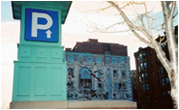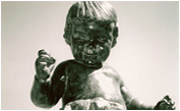|
|
||||||||
 |
 |
 |
 |
|
||||
|
|
|
|
|
|
|
|
|
|





'Where the Sun Beats'
by
There were no palm trees growing by the side of the road, no lofty cypress or high willow branches to give a body shade from the sun. It was a barren, patchy old road running west from town that ducked under the highway and ran up the levee before coming to an end at the swamp. There at the swamp was a good fishing place. As Eli shuffled in the dust in the hot afternoon, thin white clouds rising under his sneakers, he wondered if the day would bring rain. He looked up at the sky, back over his shoulder, and down to the muddied canal that ran beside the road, but there was only the punishing sun.
"Hot," Eli said. He had a jug in one hand and a pole slung over his shoulder while Johnny, his fishing pole held out like a swordsman, lunged at the dragonflies that swooped and buzzed about his head.
"Never been so hot," said Johnny.
Eli slipped down the grade of the canal and crouched where the water lapped at the bank, the murky water clouding the reflection of his sunburned cheeks. Two miles back near town, starting along the old road, he had longed for the shade of the bridge where the highway crossed the canal before everything came to the swamp. Now just ahead he could see a rig roar over the bridge and blow a long, black stream from its stack, then haul south past a sign that read "Miami 45 miles". Eli snuffed his nose.
"I would give anything for a rain cloud to move in."
"Not me," said Johnny. He was strong and broad beside Eli's taller, scrawnier form. "Rain brings out the mosquitoes. One thing I hate about the swamp, all the damn mosquitoes."
Eli pulled off his shirt and dipped it into the canal. "You can slap a mosquito," he said. He stood back from the water, wrapping the shirt on his shoulders. "Can't fight the sun."
Johnny raised his pole up toward the sky. "I'll fight the sun," he jabbed.
Looking back along the barren road, then ahead toward the bridge, Eli knew that it had been a mistake to come. The fishing would not be good; they would only stay out of the sun in the shade of the bottom weeds.
"Let's go," said Johnny. "Too hot to stand around now."
The boys followed the bank to where it ran under the highway and ducked into the shade, settling against the sandbags that piled up from the water.
The bridge was wide and low and because the highway ran on in two directions, north and south along the edge of the swamp, it was rather two bridges set side by side. In between there was an open space where the sun beat down, a shaft of light separating the shadows, and here the smells of passing traffic would creep down from above. In the shade of the farther bridge Eli could see a man lying stretched out on the sandbags, a bamboo pole laid by at his side. The brim of the man's hat hid his face, but by his bare feet, which rested nearly in the water, Eli could see that it was Cal. His skin was so brown and furrowed that it resembled the bark of a tree.
"That's a good idea," said Eli. He raised the jug to his lips and took a long swallow of water. "We can nap in the shade until it cools off a little."
Johnny was quiet, his eyes toward the water.
"I don't want to get burned," said Eli.
Johnny crept down to the canal, steadying his hand out over the water. With one quick movement he struck at the surface.
"Andy Powell was burned last week and he had to…."
"Hah!" shouted Johnny. Holding out his hand he grinned proudly. Four minnows flopped gape-mouthed in his wet palm. Settling back against the sandbags, taking Eli's jug, he tilted his head back and poured the water down his face. "Did you come out here to fish, or to complain about the weather?"
Eli looked to where the shadows vanished beyond the far side of the bridge.
"We haven't been out here for weeks," said Johnny. "And besides," he motioned to Cal snoring in the hot shade. "He's just too old for this heat."
A truck rumbled over the bridge and the smell of exhaust crept down with a stale breeze. Eli snuffed his nose. The bridge offended him for all of its noise and unnatural smells, but sitting there now, the sandbags cool and soft, he was thankful for the shade. Sitting at the levee with his pole, listening to the sounds of the glades, a duck's honking, an alligator's drone; this was his refuge from the commotion of the town. Here he could lose himself in the wetland. Silently, he hoped the day would make light traffic, but as he did another truck rumbled overhead and he suffered a sudden waft of diesel fumes. The boys took up their poles and continued under the bridge, following the bank toward the rocky slope of the levee.
"I'll bet we'll be able to see the golf course from up here," said Johnny. He started up the levee taking long, leaping strides. "They finished draining the land last week and now they're laying down dirt and digging the traps. Soon they'll start trucking in sand." He neared the top and looked north. "Yup," he pointed. "There it is."
Eli followed slowly, keeping his eyes steady against the ridge of the levee. Just over the crest was a shallow fresh pool that headed a river, feeding the swamp like a great capillary for miles ahead. As the slope came up and began to fall away the wetland rose, endless islands of trees clumped in the clear-cutting streams, waters that slithered like moccasins through miles of sawgrass. For an instant, Eli was taken in by the scene.
"So much land," he said coming up.
"Sure," said Johnny. "Eighteen holes and a clubhouse, and homes all along the fairway. In the winter when it's not so hot I'm going to be a caddy and learn to play."
Eli looked north. Where Johnny was pointing the levee had been leveled and pushed back further into the swamp. Low over the wetland hung the exhaust fumes of the machines that were digging and laying dirt. Crews of men were hard at work driving the shovels, draining the land. Not long ago the same crews had worked for many months on the construction of the highway. A truck rumbled over the bridge and blew its stack. Eli snuffed his nose, catching a faint whiff of something rotten. He turned back toward the glades.
"What's that smell?"
"I don't smell," Johnny paused. A weak, low gust of wind came in off the swamp and carried the scent up the levee, down the other side to where the boys were nearing the top. Eli tore the shirt from his shoulders and used it to cover his face.
"Ugh," he said.
Moving further up the levee the boys saw what it was. The pool where they often fished had dried, and nothing remained there but a heap of large rocks. Between the rocks, puddles of mud jumped and splattered, bursting at the air as if the earth had come to a boil. The hundreds of fish that were trapped in the mud were mostly dead, but the living slithered and squirmed in anguish, fighting each other for the last drops of wetness. A dozen sharp-nosed turtles, some buried within their shells and others with their heads hanging limp in the mud, all lay dead. In a few spots the earth was cracked and dried. The flies were buzzing.
"What's happening?" Eli said, his shirt to his face.
"The rocks must have been dumped when they built the highway."
"But all the water."
"Dried up," said Johnny. "Into the glades. Looks like we need a storm pretty bad." He stepped forward from the crest and crept down toward the rocks. Under his feet stones crumbled and rolled down the steep slope. He stepped carefully from the levee to a rock and dipped his pole into the mud.
"What are you doing?" said Eli.
Johnny fumbled his pole around in the mud, jerking up quickly without a snag. Dipping his pole again, he fumbled around and jerked, this time hooking a wriggling fish. He climbed back up the slope of the levee, and checking the hook said, "Ack, gar. There's got to be some catfish down there somewhere." Taking the fish off the hook, he dropped it into the dust, stomping down and smashing its head with his foot. Eli looked at him.
"Delany Rudd gives twenty-five cents a pound for catfish at his store," said Johnny. "There's got to be one down there somewhere."
"Come on," Eli said. It smells awful and I'm burning. Let's get under the bridge."
Johnny ignored him and moved back down the slope.
Eli snuffed his nose. The dead fish lay wide-eyed at his feet, looking up at him. He kicked it and it rolled down the opposite side of the slope. Turning back west to gaze out over the glades, the other fish flopping and squirming in the warm mud, he realized that it would take many days of good rain for the water to rise again above the rocks. He felt sick, again beginning to brood over the skin of his shoulders. To the east, he could not see the town from so far out. Looking north, though, he could see the exhaust fumes of the machines that were digging and laying dirt. The clouds in the sky were few and light.
Suddenly there was a scuff from behind and Eli turned to see Cal duck out from under the bridge, his bamboo pole in one hand, and a jar of water dangling by a string in the other. Beneath his straw hat, the hard grooves of his face told of years under the sun. He moved slow and hunched, like an old beaten dog.
"Aft'noon," Cal nodded up at Eli.
"Afternoon," said Eli, his shirt to his face.
"How they bitin?"
"Not so good," said Eli.
"Figures," said Cal. "Too durn hot." He shuffled up to the foot of the slope and stood looking down at the dead fish. "You know when I don't want 'em, I just throw 'em back," he said. Kicking the gar into the canal, he shuffled up the levee and past Eli, and at the crest he looked down at the rocks with a grim look of defeat. "Naw," he said, digging his fingers beneath his hat. "It don't look so good at all."
Eli could feel his shoulders burning but to take the shirt away from his face would mean that awful smell. He walked down the slope and crouched at the canal, wetting the shirt to wrap his shoulders. When he turned back Cal was standing with his hands to the brim of his hat, gazing out into the distance of the swamp. His silhouetted figure, high against the sun, appeared as a scarecrow before the glades, as if a wooden sign should be hung from his neck. Eli moved into the old man's shadow to look up at him.
"How long have you been coming out here, Cal?"
"Long time, I reckon," he said, looking out. "Since I was just a boy 'bout your age." He shook his head. "I ain't never knowed it to be dry as this."
"You think a rain is coming anytime soon?"
Cal pulled his jar up by the string, unscrewed the cap, and took a short swallow. "Naw," he said. "No rain comin'. In all my years I never knowed it to be dry as this." He lowered the jar, wiping his lips. "Course then there weren't no such hill and not even much of a town back that way." He turned slowly to look back east. "Sure as heck warn't no big dang highway runnin' through."
Just then Johnny appeared over the crest and came up beside Cal, holding on his hook a catfish nearly the size of his head. He greeted Cal and lifted the fish for Eli to see. "Good ten pounds," he grinned proudly.
A stale gust of wind came in off the glades. Eli cringed at the air. Quickly, he brought his shirt to his face.
"Come on," said Eli. "It smells awful."
The old man turned back toward the swamp, nodding his head. "That's what dead smells like," he said. "And if the weather don't change, you might should get used to it." He removed his hat to reveal his bald, brown head. "People round here ain't no better than termites, but I reckon you boys ought to learn it soon enough. I reckon a dead tree don't give no shade." He cleared his throat and spat into the dust. "For as long as I been fishin' this swamp here, I never knowed it to be dry as this. But I came out here and aim to get me a catch. You boys have a nice aft'noon. Don't stay out too long." Refitting his hat, and with his bamboo pole slung high over his shoulder, Cal shuffled down the other side of the slope and disappeared into the glades.
Johnny looked down at Eli. "Well," he said, "what do you want to do?"
Eli turned back toward the bridge.
"Come on," said Johnny. "It's no good just standing here."
They ducked under into the shade where the sandbags were cool and soft. Eli settled back and took a long swallow of water, then leaned back with his arms folded behind his head, watching the reflections of the water as they danced on the ceiling. A truck rumbled overhead and a soft wind picked up, whining faintly as it channeled under the bridge.
After a short, while Johnny said, "We ought to head back."
Eli was quiet, considering the old road. "I'm tired," he said. "And it's too hot to walk now. I was thinking that maybe we could stay here in the shade just relaxing, and walk back later when it cools off a bit."
Johnny held up his fish. "I want to get back to town to Rudd's store," he said. "I want to get the money for the fish."
"Let it sit in the water," said Eli. "You can sell it later."
Johnny said nothing, gazing along the road.
"Sun's too strong," said Eli. "Stupid to head back now."
Johnny sat silently for a moment. Finally he said, "I'm going to sell this fish and then I'll come back."
Eli lay there and glanced at him sideways. "You're going to come back?"
"Yeah," said Johnny. "You stay here and I'll sell the fish and come back."
"What's the hurry?"
Johnny's lips parted but nothing came.
"All right," said Eli. "Go and get your money. I'm just going to stay here until it cools off."
Johnny was silent for a moment, then said, "If I'm not back in an hour, don't bother to wait. But if you want, if Rudd will pay us for another fish, we'll come back tomorrow." He crouched at the canal to soak his shirt and ducked out into the shade, kicking up thin white clouds as he tramped onto the road. Eli watched him disappear toward the town, thinking that later he might rise and climb back up the levee to watch the dusk come over the swamp, just sit for a while to watch the daylight settle over the wetland. The vastness, the seeming endlessness; this about the glades had always pleased him. He would not be coming back tomorrow. Closing his eyes he tried to nap but every few moments a truck would pass over the bridge and the smell of exhaust would come between the shadows where the sun broke through. Lying there under the bridge, he wondered when it would rain again and hoped that it would rain soon and hard and for many days.
|
 |
||||||||||||||||||||||||||||||||||||
|
|
|||||||||||||||||||||||||||||||||||||
 |
|
||||||||||||||||||||||||||||||||||||
|
|
 |
||||||||||||||||||||||||||||||||||||
|
 |
||||||||||||||||||||||||||||||||||||
|
|
|||||||||||||||||||||||||||||||||||||
|
|
 |
||||||||||||||||||||||||||||||||||||
|
|
|||||||||||||||||||||||||||||||||||||
|
|
|||||||||||||||||||||||||||||||||||||
|
|
|
|
|
|
|
|
|
|
|
| |||||||||||||||||||||||||||
